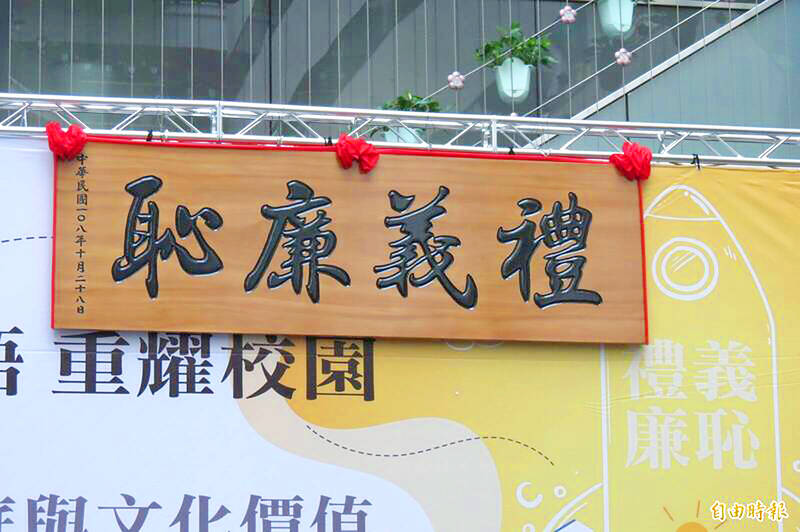A reduction in classical Chinese content under curriculum guidelines for senior and vocational high schools would lead to the “desinicization” of students, a high-school teacher has said, generating a heated discussion on the standards put in place in 2019.
Ou Kui-chih (區桂芝), who teaches Chinese literature at Taipei First Girls’ High School, on Monday criticized the Ministry of Education’s “108 curriculum” for reducing the number of classical Chinese texts taught in schools.
Writings about morality by Ming Dynasty academic Gu Yanwu (顧炎武) were not included in the guidelines, she said, calling the omission “shameless.”

Photo: Taipei Times file
The Ministry of Education said the guidelines focus on authors from different eras to build students’ competence, and help them become law-abiding citizens with proper moral compasses.
Vice Premier Cheng Wen-tsan (鄭文燦) on Friday said that memorizing classical Chinese literature does not teach students about morality.
Classical Chinese still occupies a significant portion of the curriculum, Cheng added.
Democratic Progressive Party Legislator Wang Ting-yu (王定宇) said the curriculum never “removed” classical literature, but “suggested” new texts, which were to be added at a publisher’s discretion.
If Ou believes that Ku’s work titled "Honesty and Morality (廉恥)" should be included in teaching materials, she should meet with publishers and urge them to add it, or teach the text during class, Wang said.
Writer Chu Yu-hsun (朱宥勳) said the onus of what to teach was not on the curriculum guidelines, but on the textbook publishers and the teachers, adding that while the works of poet Yu Kwang-chung (余光中) were not among the ministry’s suggested texts, many schools still teach his poetry.
Former president Ma Ying-jeou (馬英九) on Friday said he admired Ou for speaking out, while Chinese Nationalist Party (KMT) Vice Chairman Sean Lien (連勝文) yesterday said that the Democratic Progressive Party (DPP) was using the guidelines to make Taiwanese “illiterate.”
New Taipei City Mayor Hou You-yi (侯友宜), the KMT’s presidential candidate, on Friday said that if he were elected, he would chair a national affairs conference to discuss changing the curriculum guidelines.
Vice President William Lai (賴清德), the DPP’s presidential candidate, yesterday said that the guidelines were designed as a reference for publishers to gauge what materials to include in their textbooks.
Publishers should consult with teachers to discuss issues about the content of textbooks, Lai said, adding that the guidelines are not intended to be exactly what should appear in the books.
Taiwan People’s Party Chairman and presidential candidate Ko Wen-je (柯文哲) on Friday said that he opposes desinicization in the curriculum guidelines.
“Taiwan must make clear to China that we share the same language, ethnicity, history, religion and culture, but that we each have different political models and lifestyles,” he said. “We do not have to abandon the whole culture just because we are in competition with China.”
Additional reporting by Shih Hsiao-kuang, Lin Che-yuan and Peng Chien-li

Taiwan is stepping up plans to create self-sufficient supply chains for combat drones and increase foreign orders from the US to counter China’s numerical superiority, a defense official said on Saturday. Commenting on condition of anonymity, the official said the nation’s armed forces are in agreement with US Admiral Samuel Paparo’s assessment that Taiwan’s military must be prepared to turn the nation’s waters into a “hellscape” for the Chinese People’s Liberation Army (PLA). Paparo, the commander of the US Indo-Pacific Command, reiterated the concept during a Congressional hearing in Washington on Wednesday. He first coined the term in a security conference last

Prosecutors today declined to say who was questioned regarding alleged forgery on petitions to recall Democratic Progressive Party (DPP) legislators, after Chinese-language media earlier reported that members of the Chinese Nationalist Party (KMT) Youth League were brought in for questioning. The Ministry of Justice Investigation Bureau confirmed that two people had been questioned, but did not disclose any further information about the ongoing investigation. KMT Youth League members Lee Hsiao-liang (李孝亮) and Liu Szu-yin (劉思吟) — who are leading the effort to recall DPP caucus chief executive Rosalia Wu (吳思瑤) and Legislator Wu Pei-yi (吳沛憶) — both posted on Facebook saying: “I

The Ministry of Economic Affairs has fined Taobao NT$1.2 million (US$36,912) for advertisements that exceed its approved business scope, requiring the Chinese e-commerce platform to make corrections in the first half of this year or its license may be revoked. Lawmakers have called for stricter enforcement of Chinese e-commerce platforms and measures to prevent China from laundering its goods through Taiwan in response to US President Donald Trump’s heavy tariffs on China. The Legislative Yuan’s Finance Committee met today to discuss policies to prevent China from dumping goods in Taiwan, inviting government agencies to report. Democratic Progressive Party Legislator Kuo Kuo-wen (郭國文) said

Sung Chien-liang (宋建樑), who led efforts to recall Democratic Progressive Party (DPP) Legislator Lee Kun-cheng (李坤城), was released on bail of NT$80,000 today amid outcry over his decision to wear a Nazi armband to questioning the night before. Sung arrived at the New Taipei District Prosecutors’ Office for questioning in a recall petition forgery case last night wearing a red armband bearing a swastika, carrying a copy of Adolf Hitler’s Mein Kampf and giving a Nazi salute. Sung left the building at 1:15am without the armband and covering the book with his coat. Lee said today that this is a serious